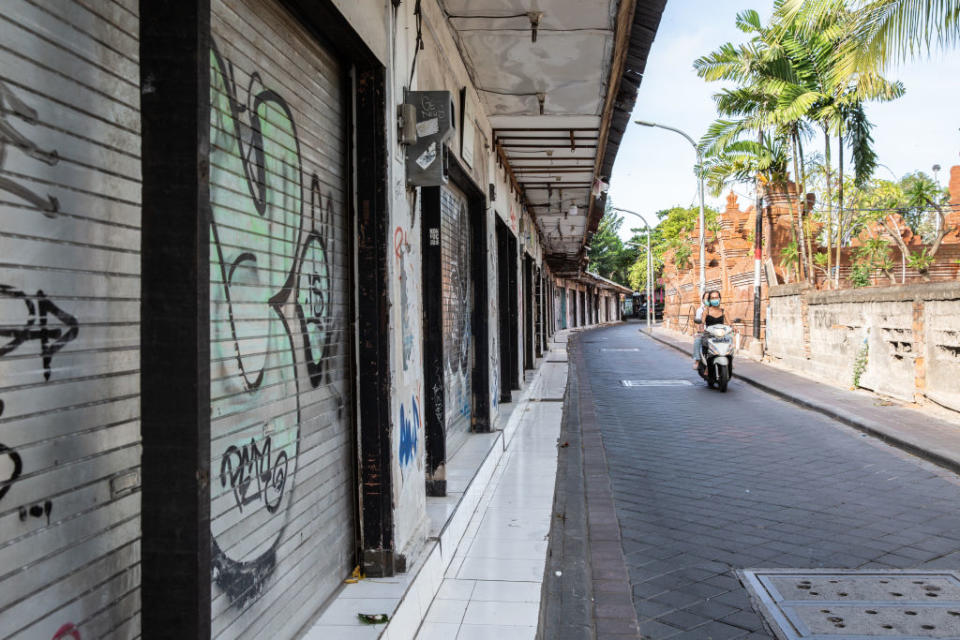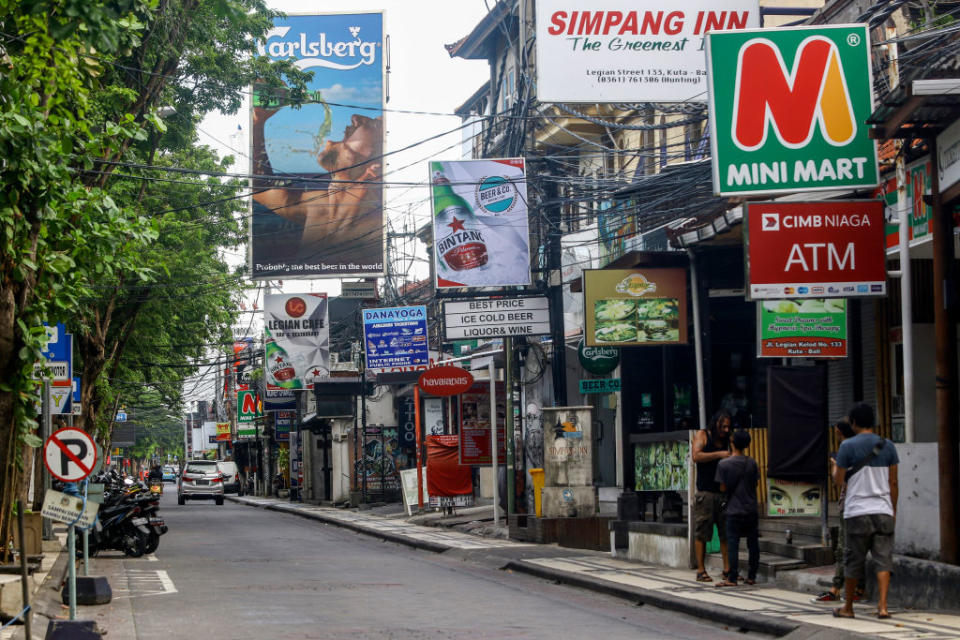'It's nuts': Idyllic tourist hotspot now unrecognisable
A popular tourist paradise for Australians is a shadow of its former self, with once bustling markets and idyllic beaches completely deserted.
Photos have emerged from Kuta, a major hotspot for tourists in Bali, where nightlife was once booming and millions of Aussies flocked to each year.
Today it mirrors a ghost town that hasn’t been lived in for years, with shops and market vendors boarded up and streets abandoned.
Jack Ahearn, who moved to Bali four years ago, shared a video on Facebook of the sad reality in Kuta, with leaves and debris resting on the floors of neglected buildings and algae cumulating in ponds.

“I drive through Kuta most days to go surf,” he said in a caption on the video.
“Every week there are more for sale signs, for rent signs, empty businesses and buildings, it’s nuts.
“The videos and pictures I post don’t do justice to the feeling this place gives off now. The only time I’ve seen it ‘busy’ since February is when there is a food handout and families are lined up by the hundreds.
“If you have the means, reach out to your holiday driver you use or any Balinese you know and love. I’m sure they could use $1 or $2.
“It’s a long, long, long way away for places like Kuta to recover.”
Devastating blow to tourist destination
Due to the coronavirus pandemic, tourism in Bali has declined exponentially.
According to Statista, the number of tourists to Bali as of June this year was just 880,000.
It was barely a fraction of the number of tourists in 2019, with Statista reporting more than six million visitors in both 2018 and 2019.
“The drop in foreign tourists was caused by the coronavirus pandemic, which has essentially paralysed the tourism sector in Bali,” Statista said.

According to the Bali Government Tourism Office, 103,087 Australians visited Bali in January, followed by 81,874 in February, 37,390 in March and just seven in April.
Zero Australians visited the tourist island in May, while just two Aussies travelled to Bali in June, seven in July and four in August.
The overall number of tourists in Bali in 2020 has declined by about 86 per cent, with just 22 visitors to Bali in August in total, compared to 616,706 for the same month in 2019.
Statista said tourism was the main economic driver in Bali and it was the centre of Indonesia’s tourism industry.

“Its economy is predominantly service based, especially those geared towards tourism and hospitality,” the market and consumer data site said.
“In 2019, Bali accounted for just under a fifth of Indonesia’s accommodation rooms in the entire country.”
‘A world of cold emptiness’
Director and photographer Jon Gwyther posted a stark account of the harsh reality in Kuta through a series of photos on Facebook.
He said he was drawn to Kuta as he searched for the fading memories of Bali beaches and sunsets.
“Like many, I’ve had numerous experiences on and around these colourful [Kuta] streets,” he wrote.
“Nothing could prepare me for what lay ahead.
“With every step I took, my heart grew heavy as a relentless and uncomfortable feeling began to overwhelm me. Everything I knew, everything I remembered, had seemingly vanished, replaced by the view of a harsh new reality.
“A world of cold emptiness surrounded me.”

Gwyther said while taking photos of the beach resort area, he spoke to a man who told him: “I don’t think Covid will kill me, but I may die of hunger.”
“Ghost town,” one commented on Gwyther’s post.
Facebook page Kuta Bali Info also posted a picture on social media of handwashing stations at a deserted Uluwatu temple.
“Normally 7000 people visit this tourist hotspot in the south of Bali every day. Now it’s between 70 to 100, mostly domestic tourists, no foreigners,” it said.
“They’ve taken all the measures to welcome tourists back again soon.”
Hopes Bali will reopen in 2021
With Australia the biggest tourism feeder, a ban on overseas travel from Australia – with people unable to leave the country without an exemption from the Department of Home Affairs – has totally shattered Bali’s economy.
But earlier this month Indonesian Minister for Maritime Affairs and Investment, Luhut Binsar Pandjaitan, said the government would give vaccinations to nine million people, according to CNN.
He said people in Jakarta would likely get the shot as it was an area that contributed greatly to the tally of Covid cases.

Authorities said the vaccinations would start in the third week of December, giving hope restrictions on Bali would be lifted and it could reopen in early 2021.
“We’re keen to see Bali become a green zone, which is our target,” Pandjaitan said.
“We are optimistic that Bali is becoming a green zone at the start of next year, as we will commence vaccinations in the third week of December.”
According to Johns Hopkins University data, Indonesia has reported more than 448,000 cases and more than 14,000 deaths.
Do you have a story tip? Email: newsroomau@yahoonews.com.
You can also follow us on Facebook, Instagram and Twitter and download the Yahoo News app from the App Store or Google Play.




